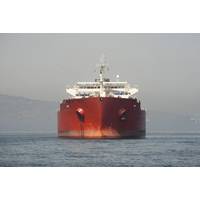Bloomberg reports that Mercuria is betting big on aluminum in a peace agreement with Russia.

Bloomberg News reported Thursday that Mercuria Energy Group had built up a large aluminum position at the London Metal Exchange. The company was betting on a tightening of the market if sanctions were eased against Moscow. Bloomberg reported that Mercuria has contracts for more than 1 million tons aluminum, which is several times what's currently available on the LME. This, Bloomberg noted, had helped to drive a rapid tightening of the market in recent days. According to the report, sources who asked for anonymity in order to discuss confidential information, have been in touch with Mercuria regarding its aluminum position.
Is an Oil Market Recovery Underway? Energy Trader Mercuria Sees Positive Signs

Global oil markets are showing early signs of re-balancing after production cuts by OPEC and the United States, with the market's pricing structure indicating that storing oil on idle tankers may soon no longer be profitable, Mercuria Energy Group said.Oil futures are cheaper for nearby delivery than for a few months ahead, a pricing structure known as contango, which is usually a sign of oversupply. Traders use this structure to store oil to sell it later at a profit.The contango for Brent oil futures has shrunk from more than $3 a barrel during most of April to around $1.50 a barrel on Friday.
Record Number of VLCC Liftings at LOOP

Medium-sour crudes from the U.S. Gulf of Mexico are being snapped up by overseas buyers, paving way for a record six supertankers to load at the Louisiana Offshore Oil Port (LOOP) in a matter of weeks, according to people familiar with the matter.The six scheduled loadings in late May and early June would double the record of Very Large Crude Carriers (VLCCs) reached in December. An unusual influx of Gulf of Mexico crudes to the U.S. deepwater export port and weakening prices are contributing to the exports, according to one of the people close to the matter.Mars Sour, a Gulf of Mexico crude produced by Royal Dutch Shell Plc, traded at a $4.40 a barrel premium to U.S.
Oil Majors Join Blockchain Platform

Oil majors Chevron and Total, along with major Indian refiner Reliance Industries, have joined the blockchain-based platform Vakt, London-based Vakt said on Tuesday.Vakt, already in use by other major trading firms since the end of last year, is the first of many blockchain pilot schemes for commodities trading to go live.The firm was created in 2017 by a consortium that includes oil majors BP and Royal Dutch Shell, Norway's Equinor, global energy trading firms Mercuria Energy Group and Koch Supply and Trading, as well as Gunvor Group.Its original shareholders began using the system in November…
Key People Changes in Aegean Marine Petroleum Network
International marine fuel logistics company Aegean Marine Petroleum Network (AMPNI) announced that President Jonathan McIlroy will leave the Company, effective November 15, 2018.The marine fuel and lubricants supplier announced last month the appointment of Kostas Polydakis to the position of Chief Operating Officer, as well as his qualifications and experience.Polydakis is serving on the Company’s Management Committee, along with the Company’s Chief Financial Officer, and the Company’s Global Director of Supply and Trading. Effective November 15, 2018, Polydakis will assume Mr.
Mercuria Energy Takes 30% Stake in Aegean Marine
Mercuria Energy Group and Aegean Marine Petroleum and have signed a Memorandum of Understanding (MoU) making Mercuria the only lender to Aegean. Both are working towards landing a billion dollar credit deal and closer collaboration.Mercuria and Aegean have executed a letter agreement detailing the US$30 million of incremental liquidity Mercuria is providing to the Company by way of amendments and waivers to the Trade Finance Facility and other financing arrangements.With this significant step completed, the two parties intend to begin exploring a broader, global strategic partnership.
North American Exodus at PetroChina Sparks Speculation
A flurry of departures across the U.S. and Canadian units of Chinese state energy firm PetroChina Co Ltd have sparked speculation that the oil trader is reducing its presence in North America, even though the company says it is committed to the region. More than 30 people in its Houston and Calgary offices have left PetroChina since 2016, including heads of desks in crude, financial, natural gas and chemical trading, the company confirmed to Reuters. Sources say that PetroChina had approximately 150 to 200 people at its peak two to three years ago, and now has between 100 and 150.
Noble Group Reports $1.75 Bln Q2 Loss
Commodities trader Noble Group reported a second- quarter loss of $1.75 billion on Thursday, weeks after warning it faced its steepest quarterly loss in a year and a half and would slash jobs and sell assets to cut debt. Once Asia's largest commodities trading house, Noble is slimming down drastically to its core Asian coal trading business after a crisis-wracked two years. Last month, it announced the sale of its U.S. gas and power business and began a process to sell its oil liquids unit. "Conservative liquidity management, scaling back of risk positions…
At Noble Group, Staff Exits and Debt Increase Risks
Noble shares fall as much as 49 pct after overhaul plan. Noble Group is slimming down drastically to its core Asian coal-trading business, but that may not be enough to revive its fortunes due to a staff exodus, shrunken balance sheet and debts of more than $3 billion, analysts and industry sources say. Once Asia's largest commodities trading house, Singapore-listed Noble is a shadow of what it was during the boom years, when it snapped up assets from sugar mills to coal mines and expanded globally to rival Glencore and Trafigura. In a dramatic overhaul announced on Wednesday, it sold its U.S.
Noble in Mercuria Deal as it Cuts Debt, Expenses
Noble agrees to sell U.S. gas and power business to Mercuria. Commodities trader Noble Group announced a dramatic overhaul on Wednesday that will involve a partnership with rival Mercuria, as it flagged assets sales, efforts to more than halve its staff numbers and a crippling quarterly loss. In a surprise announcement, Singapore-listed Noble said the need to scale back risk and conserve cash had battered its business in the quarter and it would also write down the value of some of its assets, resulting in a loss of $1.7 billion to $1.8 billion - more than double its market value. The company, which has been scrambling to raise cash and cut back its debt, said it would sell its U.S.
Morgan Stanley Focuses on Smaller, Smarter Trades
Nancy King, global head of commodities trading at Morgan Stanley, has spent the last few years remodeling what used to be one of the most profitable units on Wall Street, by downsizing and focusing on smaller, smart trades for customers instead of the big, risky bets it used to make on its own account. The shift in strategy, which has cut the size of Morgan Stanley's commodities business by roughly two thirds, was largely forced on the bank by post-financial crisis regulations that banned banks from using their own money on potentially risky speculation, and increased capital requirements.
Trafigura Mulls Minority Stake in Essar Oil
Commodities trader Trafigura Group Pte is in talks to buy a minority stake in Essar Oil Ltd, which runs India's second biggest private sector refinery, in a deal that could be valued at around $6.5 billion, Bloomberg reported. Trafigura is discussing the purchase of at least 15 percent of stake in Essar Oil while the owners of Essar Oil are interested in selling up to 30 percent, Bloomberg reported, citing people familiar with the matter. Trafigura could also get a stake in Essar's more than 2,000 retail fuel stations, a power plant and the Vadinar port, Bloomberg reported.
Son of Circus Thrives as Crude-Oil Traffic Cop
The rows of traders who line the massive trading floor at Mercuria Energy Group's Houston headquarters rely on a string of modern conveniences to execute deals across the globe. But when they're under the gun to deliver oil fast, they call one person: Tim Holan. That's because Holan, the head of logistics for the trading firm, cut his teeth on moving an even heavier cargo: elephants. They, along with lions, clowns and other performers were part of the mile-long moving city that Holan spent nearly two decades shuttling around the country as logistics manager for the Ringling Bros and Barnum & Bailey Circus.
BP, Shell, Morgan Stanley Seek End of Oil Price-Fixing Lawsuit
BP Plc , Royal Dutch Shell Plc, Morgan Stanley and other companies urged a U.S. judge to dismiss nationwide litigation claiming they conspired for 12 years to fix prices of Brent crude oil, a benchmark for the cost of gasoline and heating oil. In papers filed on Monday night in U.S. District Court in Manhattan, the defendants said there was no evidence they colluded to manipulate spot prices or intended to do so, in violation of U.S. commodity and antitrust laws. They also said that because the alleged manipulation took place outside the United States and was governed by foreign law, U.S. courts had no authority to handle the case to begin with.